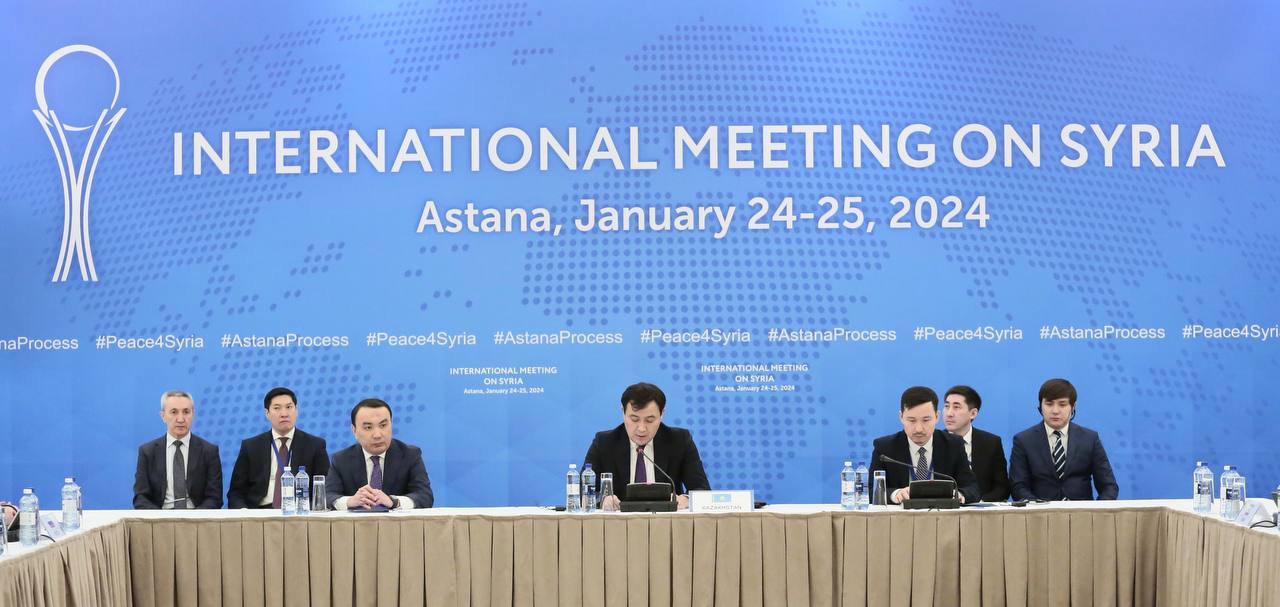ASTANA – The representatives of Iran, Russia and Türkiye, as guarantors of the Astana Format, emphasized the need to secure unhindered humanitarian aid to Syria, join efforts to combat terrorism and encourage mutual release of detainees at the 21st International Meeting on Syria within the Astana Process on Jan. 25.

Kazakh Deputy Minister of Foreign Affairs Alibek Bakayev (M) at the plenary session. Photo credit: Kazakh Ministry of Foreign affairs.
The delegations of Iran, Russia, Türkiye, the Syrian government, the Syrian opposition, as well as the United Nations (UN), the UN High Commissioner for Refugees, the International Committee of the Red Cross, Iraq, Jordan and Lebanon participated in a two-day event that concluded with the adoption of the joint statement by representatives of Iran, Russia and Türkiye.
“Due to the Astana process, there is every reason to say that the situation in Syria has stabilized and is on the verge of recovery. Difficult problems that seemed intractable are being effectively resolved thanks to the massive efforts of the guarantor countries and the constant support of the United Nations,” said Kazakh Deputy Minister of Foreign Affairs Alibek Bakayev at the plenary session.
Since January 2017, Kazakhstan has hosted 19 out of 21 international meetings on Syria in the Astana format.
“The negotiations in Kazakhstan have led to the establishment of de-escalation zones, an end to the bloodshed among conflicting parties and a decrease in the scale of human casualties. These achievements represent the initial goals of the Astana process in Syria,” added Bakayev.
He emphasized the need for a peaceful resolution.
“We firmly believe that the only way to bring an end to the tragic period in Syrian history is through a politico-diplomatic approach by the international community, in accordance with the UN Charter and relevant UN Security Council resolutions,” said Bakayev.
The joint statement by representatives of Iran, Russia and Türkiye featured 20 resolutions and emphasized the leading role of the Astana Process in “promoting the lasting settlement of the Syrian crisis.”
One of the statement’s key points concerned the negative impact of the escalation of the Palestinian-Israeli conflict on the situation in the Syrian Arab Republic.
The sides expressed “deep concern over the humanitarian catastrophe in Gaza and stressed the need to end Israeli brutal onslaught against the Palestinians and send humanitarian aid to Gaza.”
The statement also covers demands such as the need to ensure the unimpeded flow of humanitarian aid to Syria, to work together to combat terrorism and to stand against separatist agendas aimed at undermining the sovereignty and territorial integrity of Syria and to continue operations on the mutual release of detainees or abductees.
Head of the Syrian government delegation and Vice Minister of the Foreign Affairs of the Syrian Arab Republic, Bassam Sabbagh, highlighted the importance of humanitarian aid and the release of detainees.
“We discussed some of the efforts from the Syrian part closely connected with the security and by the settlement of the situation to ensure all the humanitarian aid supplies [to be delivered] for people in order to make people’s spirits stronger. In that sense, I would like to say that the Syrian Republic supports all the agreements that are supported by the UN in order to provide humanitarian aid supplies to Syria for the next six months and to provide humanitarian aid supplies to the regions that suffered from earthquakes last year,” said Sabbagh.
“As for the return of the refugees to their homeland, the government of Syria considers this a vital issue. We’re having some meetings with the representatives of the UN, with the High Commissioner of the UN, in order to return all the refugees to their homelands. We already achieved some progress in that direction,” added Sabbagh.
The head of the Syrian armed opposition Ahmed Toma emphasized the positive impact of peacekeeping efforts within the Idlib de-escalation zone.
“I think that we achieved some results and understanding between the delegations about the settlements and about the peacekeeping in Idlib. We also hope that in the near future in Idlib, we will solve all the issues without any violations and forces of the army,” said Toma.
He also expressed concern about people in detention, stating that settling that issue with the Syrian government will “lead to the democratic decision of our republic and it will make our community and country democratic.”
Head of the Iranian delegation, Iranian foreign minister’s senior advisor for special political affairs Ali Asghar Khaji reiterated that any political process in Syria must respect the nation’s sovereignty.
“Once again, we reaffirmed the fact that any political process in Syria should ensure and respect Syrian sovereignty and territorial integrity. And we emphasize the political resolution of the Syrian crisis. Everybody admitted that based on our experience with Syrian problems, there is only a political solution and there is no military solution,” said Khaji.
The sides agreed for the next meeting, which will take place in the second half of 2024 in Astana.

